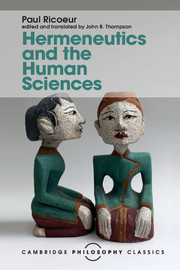Book contents
- Frontmatter
- Contents
- Preface to this edition
- Acknowledgements
- Editor's introduction
- Notes on editing and translating
- A response by Paul Ricoeur
- Part I Studies in the history of hermeneutics
- Part II Studies in the theory of interpretation
- Part III Studies in the philosophy of social science
- 8 The model of the text: meaningful action considered as a text
- 9 Science and ideology
- 10 The question of proof in Freud's psychoanalytic writings
- 11 The narrative function
- Select bibliography
- Index
11 - The narrative function
from Part III - Studies in the philosophy of social science
Published online by Cambridge University Press: 05 July 2016
- Frontmatter
- Contents
- Preface to this edition
- Acknowledgements
- Editor's introduction
- Notes on editing and translating
- A response by Paul Ricoeur
- Part I Studies in the history of hermeneutics
- Part II Studies in the theory of interpretation
- Part III Studies in the philosophy of social science
- 8 The model of the text: meaningful action considered as a text
- 9 Science and ideology
- 10 The question of proof in Freud's psychoanalytic writings
- 11 The narrative function
- Select bibliography
- Index
Summary
The aim of this essay is to sketch a general theory of narrative discourse which encompasses both the ‘true’ narrative of the historians and the ‘fictional’ narratives of storytellers, playwrights and novelists. What is at stake is the possibility of delimiting the act of narrating which is common to these two narrative types. To use Wittgenstein's vocabulary, if narrating is a unique ‘language-game’, and if a language-game ‘is part of an activity or a form of life’, then we must ask to which form of life narrative discourse as a whole is bound. That is what I call ‘to inquire into the narrative function’.
The inquiry may be pursued at two different but interconnected levels: the level of sense and the level of reference. At the first level, the problem is whether history and fiction have a common structure, that is, a common way of ordering sentences on the properly discursive plane. This first analysis has and must retain a formal character. At the second level, the problem is whether, in spite of the evident differences in the way that history and fiction are related to ‘reality’ – in whatever sense of the word – they refer nonetheless, each in its own way, to the same fundamental feature of our individual and social existence. This feature is characterised in very different philosophies by the term ‘historicity’, which signifies the fundamental and radical fact that we make history, that we are immersed in history, that we are historical beings. The ultimate problem is thus to show in what way history and fiction contribute, in virtue of their common narrative structure, to the description and redescription of our historical condition. In a word, what is ultimately at stake in our inquiry is the correlation, or better the mutual belonging, between narrativity and historicity.
The structural unity of historical and fictional narratives
It should not be assumed that the structural unity of historical and fictional narratives is easier to establish than their common reference or, as I shall say later, than their reference crossing upon our historicity.
- Type
- Chapter
- Information
- Hermeneutics and the Human SciencesEssays on Language, Action and Interpretation, pp. 236 - 258Publisher: Cambridge University PressPrint publication year: 2016
- 18
- Cited by

